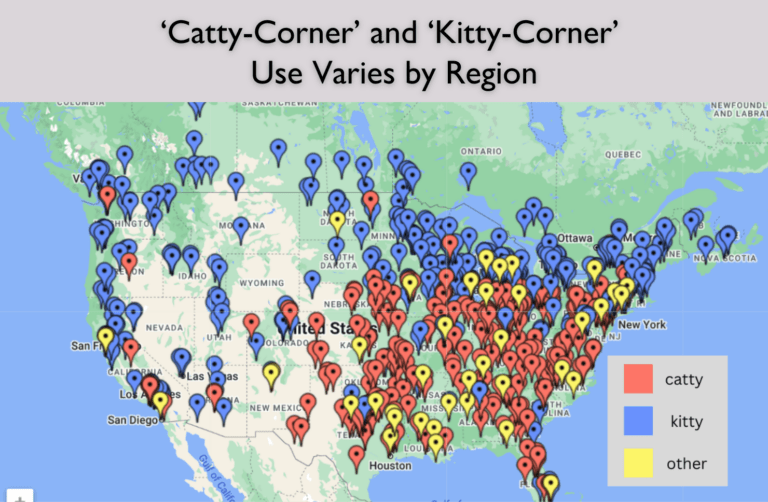If you watched the recent “Curb your Enthusiasm” finale on HBO, you may have been delighted to see the old Americanism “catawampus” playing a central role in the plot.
‘Catawampus’ on ‘Curb Your Enthusiasm’
Among all the typical quirkiness that led to Larry David being put on trial for giving a bottle of water to a voter, that voter rips him to shreds on the witness stand after hearing Larry’s manager Jeff use the word (da-da-da) “catawampus” and realizing he had earlier tricked her into revealing her secret salad dressing recipe on a phone call in which he used that word. Mirroring the final episode of “Seinfeld” from way back in 1998, which was written by Larry David, in this final episode of “Curb Your Enthusiasm,” David is sentenced to jail. But unlike the “Seinfeld” characters who ended the show in the clink, he gets a reprieve when the sentence is thrown out.
In his Wall Street Journal column on “catawampus” and the “Curb Your Enthusiasm” finale, linguist Ben Zimmer said, “Jeff Schaffer, who co-wrote and directed the episode, told me they hunted online for an odd-sounding Southern word: “Somewhere among ‘fixin’’ and ‘gumption’ and ‘yonder’ there was ‘catawampus.’”
And “catawampus” is a great fit for this oddball show. Most people have probably heard it, but it’s rare. It’s vastly less common than “gumption” and “yonder” in a Google Ngram search, for example.
The origin and meaning of ‘catawampus’
Although originally, in the 1830s, it referred to a fierce imaginary animal, today it means “askew, awry, wrong in a discombobulated way” or to be diagonally across from something.
If someone were planning an elaborate birthday party for a child but when they picked up the cake it said, “Happy retirement, Bob”; the bouncy house wouldn’t inflate; and the caterer delivered escargot instead of chicken fingers, that parent might lament, “It’s gone all catawampus!”
Better yet, “catawampus” is part of a group of words that are said and spelled in all kinds of different ways, making Jeff’s specific pronunciation in “Curb Your Enthusiasm” even more of an identifier. My mom used to say “kitty-wampus,” for example, instead of “catawampus,” and Etymonline also shows “cattywampus” — spelled a couple of different ways.
‘Kitty-corner’ or ‘catty-corner’?
And that “diagonally across from something” meaning leads us to “kitty-corner” or “catty-corner,” which are just two of many similar words people use, which vary by region.
Many years ago I surveyed my Facebook fans and made a map of where people use these different words. What I found was that people in the South, as far west as Texas and as far north as Pennsylvania and Nebraska, are much more likely to say “catty-corner,” whereas everyone else in the U.S. and Canada is more likely to say “kitty-corner.”
Many other spellings
But people reported using many other words. In many cases, it seemed as if they may have only heard the saying and then guessed at the spelling. Responses included:
- cat-corner
- carry-corner
- cat-a-corner
- caddy-corner
- catta-corner
- cata-corner
- cat-uh-corner
- ketty-corner
- kiddy-corner
- kiddie-corner
The Dictionary of American Regional English has even more variants: “kitty-cross,” “kitty-katty,” and “kittering,” which means “askew” instead of “diagonally across” like all the others.
Nobody knows for sure where these words came from, but we have some clues. They probably all go back to another American dialect word, “cater,” which means “to set or move diagonally” and which came from the French word for “four”: “quatre.” And Etymonline says the “wampus” part in “catawampus” could be “related to Scottish ‘wampish’ [meaning] ‘to wriggle, twist, or swerve about.'”
The bottom line is that “kitty-corner,” “catawampus,” and their friends are considered dialect and informal. “Kitty-corner”-type words seem to commonly take a hyphen, but other than that, you can spell them pretty much any way you want. But if you work for a formal publication, do check how it’s spelled in your organization’s style guide or recommended dictionary. For example, Merriam-Webster shows “kitty-corner” and “catawampus” as the primary spellings. And if you use the word often, be consistent in your spelling. You wouldn’t want your readers to get a sense that your writing is all catawampus.




